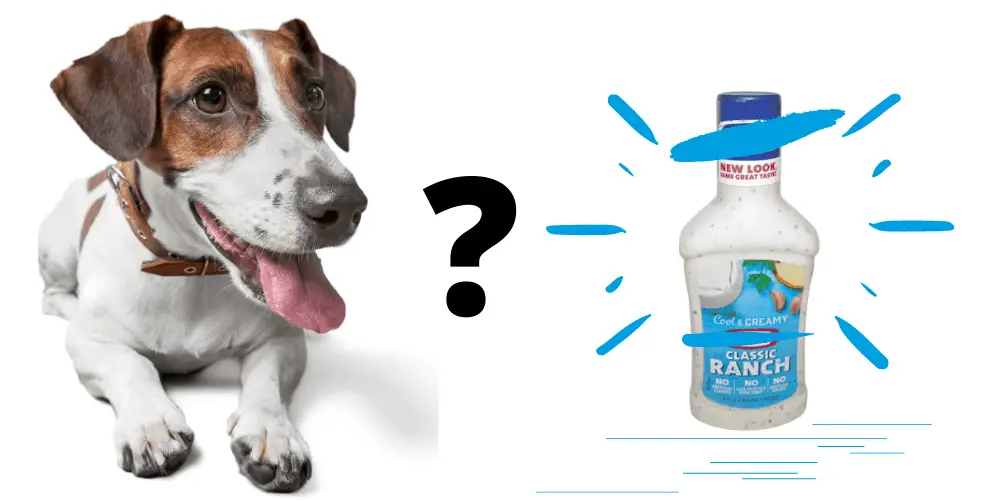Ranch dressing is among the most popular topping for a variety of foods, but most often present in a salad.
If people can eat it, can dogs eat ranch? After all, it looks harmless enough and is awfully tasty.
Feeding your dog ranch in any form is not advisable. Not only is it unhealthy for the dog, but there are also ingredients such as garlic and onion that have been proven to be toxic to dogs. There are some dog-friendly ingredients in the ranch, but the dangers of others outweigh them.
Why Can’t Dogs Eat Ranch?
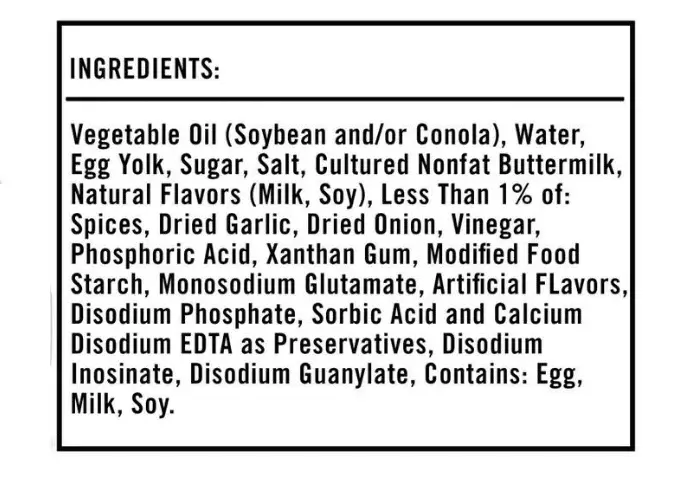 When you take a good look at the ingredients in ranch dressing, there isn’t anything in there that benefits the dog.
When you take a good look at the ingredients in ranch dressing, there isn’t anything in there that benefits the dog.
Yes, most brands have buttermilk, which has many health benefits for dogs, unless the dog is lactose intolerant, which many seem to be.
But just because one or two ingredients are healthy for a dog, doesn’t mean we should ignore the unhealthy ingredients.
Here is a list of ingredients that can be found in popular home-made recipes of ranch dressing.
- Buttermilk– Buttermilk is found to be a healthy treat for dogs, and contains probiotics that assist in lactose digestion. Some people have found that if a dog has stopped eating for any reason, that a little bit of buttermilk provokes the dog to pick back up its eating habits. However, this is an observation, and what people have found to work, not an official study.
- Sour Cream– Dogs that are not lactose intolerant can eat sour cream without suffering from any immediate issues, and is not toxic. Dogs can share in the benefits of sour cream that we do, but overall, it’s not healthy food that it should eat often. Sour cream contains a high-fat content that can affect your dog down the road.
- Mayonnaise– When consumed in small amounts, there is nothing toxic about mayo concerning your dog. But similarly found with sour cream, mayo contains a high-fat content that can lead to dog obesity when consumed regularly.
- Garlic– As stated above, garlic is considered toxic to dogs. We can eat it and can process it properly and reap the healthy benefits from garlic. But dogs don’t digest it in the same way that we do. In fact, chemicals found in garlic wind up doing damage to a dog’s white blood cells, causing hemolytic anemia.Though a good amount of garlic must be consumed before it becomes toxic, the measurement of a “good amount” changes from dog to dog, depending on all kinds of factors.
- Parsley– Parsley, in very small amounts, is known to be healthy for dogs. However, it contains a chemical called furanocoumarin, which can be toxic to dogs at higher levels. Because of this, the ASPCA has deemed parsley to be labeled as toxic to dogs, cats, and horses.
- Dill– Dill has proven to be a great dog food additive. It is non-toxic to its system and is packed with all kinds of health benefits. Dill also appears to be tasty to most dogs and is at the core of why many dogs wind up loving dill pickles. This is one spice that is safe for dogs, particularly when given in moderation.
- Chives– Chives come from the same family as garlic and onions. The Allium family. The dangers involved with chives to your dog are similar to those of garlic. And as with garlic, the levels of toxicity become more dangerous the more a dog consumes it.
- Onion Powder– Like chives and garlic, onion powder is toxic to dogs. It causes major problems with your dog by wreaking havoc on its white blood cells. Due to the wide range of people food that contains this ingredient, it’s best to always keep an eye out for it before considering sharing with your dog.
Are Ranch Ingredients Healthy for a Dog?
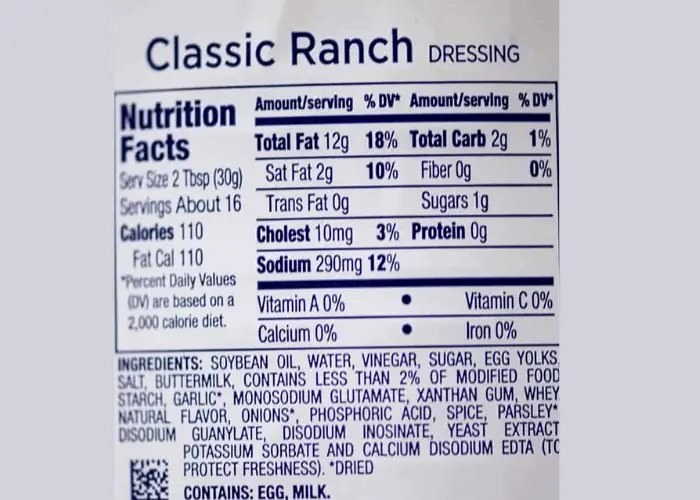
Well, after having a closer look at the major ingredients above, you should have a good idea of what the answer to this question should be.
Out of this list of eight most popular ingredients found in a recipe of ranch dressing, dill is the only ingredient considered safe to be consumed by dogs without any caveats.
All seven other ingredients are either okay for the dog but contain too much fat (unhealthy), or are downright toxic and should be avoided at all costs.
On top of all this, this is a recipe that you can use to make ranch yourself. Often in these types of articles, we find that a “home-made” version of a food is better for a dog because of what you can either put in or take away from the recipe. This is not one of those cases. Made at home is just as dangerous in a lot of ways.
What you pick up off of the shelf at your local food store will be packed with all kinds of other ingredients and preservatives that you don’t want your dog to deal with either.
Can Dogs Eat Ranch Chips?
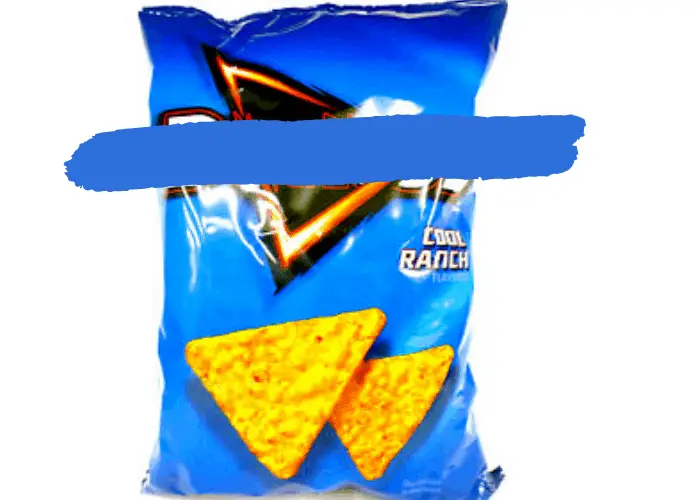
Many of the same ingredients in ranch exist in ranch chips. Just because everything has been reduced down to a powdered form, it doesn’t mean that the powders will be less toxic to a dog. It only means that it’s dry and will stick to a chip.
Dogs shouldn’t be eating ranch in any form, be it from a bottle, home-made, or dry and plastered to chips.
Plus, the chips are unhealthy enough for a dog by themselves. Adding ranch makes it take the corner from unhealthy to toxic.
Some chip styles and brands already have some of the toxic ingredients in them already, such as nacho cheese.
So, a bag of “Cool Ranch Doritos” might hit the spot for a person but have compounding ingredients in them that are very dangerous for a dog.
Particularly if they wind up with their head in the bag, wolfing it all down. Be careful where you put any food items when a dog is around!
Conclusion
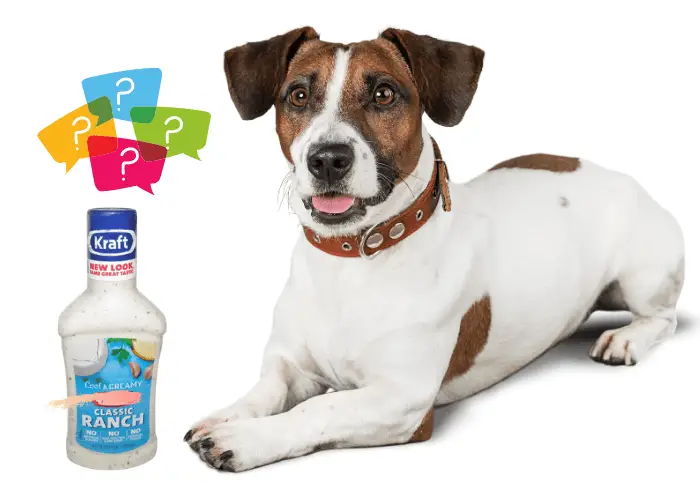
Will your dog keel over if they wind up with a small amount of ranch? Are its days done if it steals a couple of chips? No. It’ll probably be fine, and you shouldn’t panic.
However, keep your eye on the dog and look for any signs of discomfort or different behavior.
All dogs are different, and some breeds are more affected by the ingredients than others. If it seems that it isn’t acting normally, or gets ill, contact a veterinarian for any useful instruction, or to make an appointment.
You’ll find more Dog Nutrition Questions in the links below:

